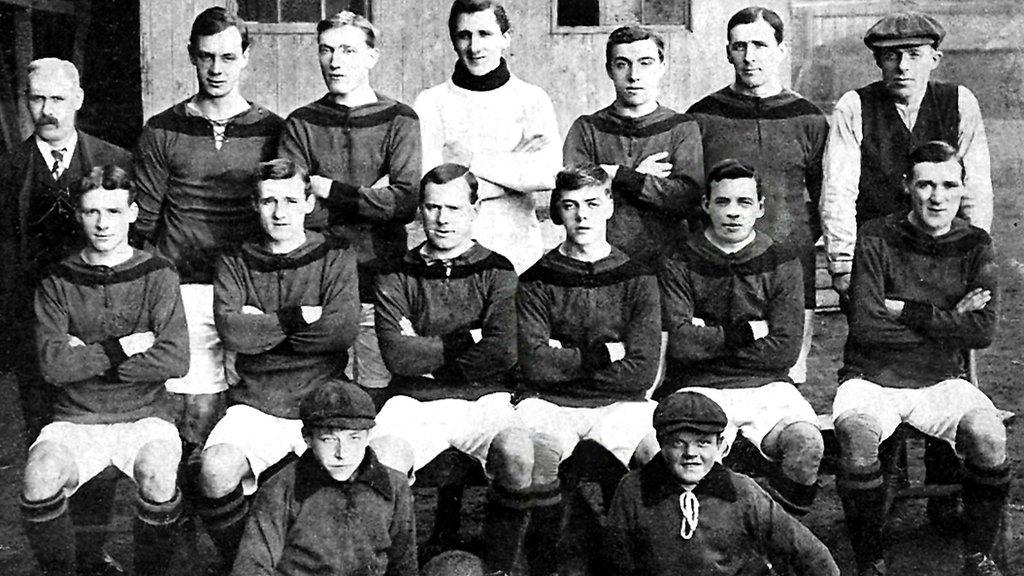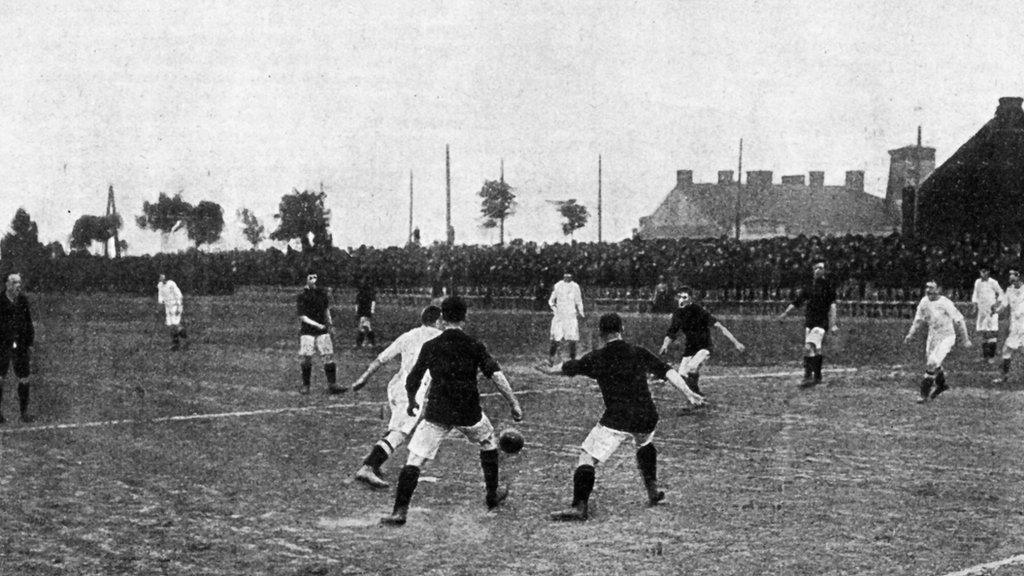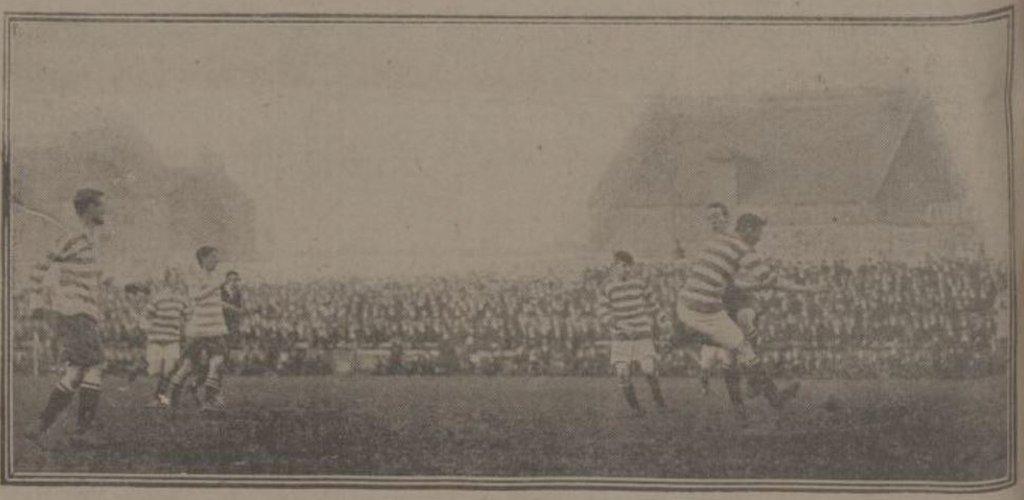One Saturday Before The War: How two Scottish brothers fill in blanks of history-making team
- Published
What connects the Titanic, a sold-out Belfast stage play about "possibly the first cup won by a British professional football team on foreign soil", the threat of world war and searching a Glasgow cemetery for long-lost graves?
No, it's not about Celtic's Lisbon Lions, although the graveyard lies in the shadow of their famous stadium and the Parkhead club also play a prominent part in this story.
This story is about Glentoran and two Scottish brothers who scored their three goals against Linfield that secured their first Irish Cup final triumph in 1914 before helping them go on to lift the Vienna Cup that same summer.
It is a search involving two of my great uncles - and a story I knew nothing about until being contacted by Alan Godden, who helped Sam Robinson research his book, 'One Saturday Before The War', and alerted me to the BBC Northern Ireland documentary about it.
'Europe's best' forged in Belfast shipyard

James (second left, middle row) and William Lindsay (far right, middle row) both scored in the 1914 Irish Cup final
I knew James Lindsay had played for the Burnley side that won the English league title in 1921. I knew that he also turned out for Clyde and Glentoran.
What I didn't know was that he had played in green, red and black alongside his older brother, William, and that together they embarked on a remarkable 3,500-mile journey around Europe in which they and their team-mates played six games in 12 days. It was a journey made more precarious by troop manoeuvres being undertaken in anticipation of a world war declared weeks after their return.
At the time, many of Britain's best teams were being invited on summer tours to the continent and Austria's oldest club, First Vienna, had the bright idea in 1914 of hosting the cup winners from England, Ireland and Scotland.
Robinson's book reveals that, given Ireland had just won the British Home Championship for the first time, the Glens were being billed by Bohemia's newspapers as the best club team in Europe.
What they failed to mention, or perhaps even realise, was that, unlike Celtic and Burnley's full-time professionals, the 13 on tour from Ireland trained two nights a week while most worked at Belfast's Harland & Wolff - the shipyard from where the Titanic had been infamously launched just two years earlier.
Burnley, Celtic & 'Battle of Britain'

Glentoran beat a Vienna Select to lift the Vienna Cup
The English or Scottish cup winners could have beaten the Glens to a trophy on Continental soil.
On the day Glentoran, hungover from a seven-hour en-route bender, started their tour with a 4-3 defeat by Deutcher FC Prag - a side managed by Scotsman Johnny Dick - Celtic and Burnley were playing out a 1-1 draw in what was billed as the Battle of Britain in Budapest.
However, although the Glasgow side would win a replay 2-1 at Turf Moor that September, the Budapest Cup would never be presented - or even leave Hungary.
Meanwhile, having followed up with a 4-1 win over Hertha Berlin, Glentoran would face a Combined Vienna XI for the Vienna Cup. Although that too finished 1-1, the Irish side would win a hastily arranged replay 4-0.
With Burnley players and management in the stands, James Lindsay's two goals would earn him a move to the English club while the Vienna Cup would go on to earn mythical status in Glentoran's trophy cabinet.
That was until Robinson was handed the task of unearthing the long-lost story in newspapers from around Europe in preparation for an exhibition at the Fifa Football Museum in Zurich at the personal invitation of the world governing body's president, Gianni Infantino.
"Unless proved otherwise, the Vienna Cup is the oldest trophy still in existence to have been won by a British/Irish club on mainland Europe and the first to have been won by a professional side," Robinson told me while pointing out that English side West Auckland lifted the Lipton Cup, played in Italy, as amateurs in 1909.
"Fifa's insistence that the trophy be displayed as part of the 211 Cultures, One Game exhibition gives the achievement the gravitas it deserves."
Search for graves and possible movie
Not satisfied with the resulting book, stage play, TV documentary and year-long loan of the Vienna Cup to the Swiss museum, the author and his researchers are on the trail of 13 graves with the idea of picturing the trophy with each.
"Once I started to research the story, I felt a sense of sadness that their achievements had never really been celebrated properly," Robinson explained. "The outbreak of the Great War had overshadowed everything.
"The heroes of Vienna hadn't even managed to have a team photograph taken with the Vienna Cup. I felt as a lifelong Glentoran supporter that the least I could do was re-unite them with the trophy they had won in their finest hour-and-a-half as Glentoran players."
Among those already tracked down are Kilmarnock-born Jimmy Reid, William Emerson, who would go on to join Clydebank, Arbroath and Dundee, Davy Lyner, who would play for Ireland, Manchester United, Kilmarnock and Clydebank, and brother Roly, who would be cremated in Aberdeen, where he moved to work on the Hall Russell shipyard.

William Lindsay (right) had earlier played for Greenock Morton
Researchers have all but given up on finding the final resting place of William McAlpine considering the former defender was a merchant seaman, which left the Lindsay brothers as the last realistic jigsaw pieces still to be found.
Having recently travelled to Glasgow, Godden tells me he thinks he has found James' unmarked grave deep inside the Eastern Necropolis based on his death in 1951 at the age of 60 - a mere 25 years after his career ended at Bathgate juniors following spells with St Mirren, Belfast United, Linfield, Llanelli, Larne and Accrington Stanley.
But the search for William, who had previously played for Greenock Morton and whose death was recorded in the Park Circus area of Glasgow at the grand old age of 91 in 1976, goes on.
A cutting from the time suggests James and William were two of four brothers "who have figured in high-class football".
I knew my grandfather David, who died in 1955 before I was born, played junior football, my father having told me he was banned sine die for punching a referee. What of younger brothers John, Samuel and Robert? My own search has just begun.
Meanwhile, Robinson told me: "I couldn't have imagined when I began to peel back the layers of this story for the book, One Saturday Before The War, that it would lead to a critically acclaimed BBC documentary and a sell-out play.
"Our new owner at Glentoran, Ali Pour, who attended the play during his recent visit to Belfast, has indicated that he is keen to explore the possibility of turning the adventure into a feature film. He has previous experience of film making. This tale has it all."